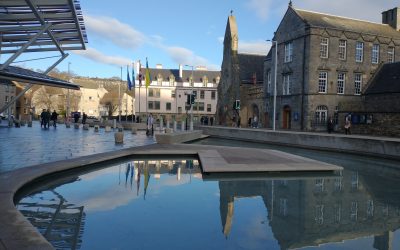 We’re in the grip of bitter winter weather. For several days it’s felt as if the country has ground to a halt while ‘The Beast from the East’ roars around us. My inbox is full of mail from fellow free-lancers who, like me, have had concerts cancelled because of the snow and the dangerous travel conditions.
We’re in the grip of bitter winter weather. For several days it’s felt as if the country has ground to a halt while ‘The Beast from the East’ roars around us. My inbox is full of mail from fellow free-lancers who, like me, have had concerts cancelled because of the snow and the dangerous travel conditions.
It makes one very aware of the fragility of the free-lance life. Not only is the concert cancelled, but the fee disappears too. A nice concert organiser will try to find a replacement date later in the season, but often it’s not possible for a myriad practical reasons.
I found myself saying to a neighbour, ‘It’s such a shame – I had done so much work for that concert. In fact, the only bit of the work I hadn’t done was to play the concert itself.’ ‘How interesting!’ he said. ‘I thought the concert was the work.’
Well, it is work, of course, but any concert is the culmination of day-by-day practice, learning of new music, organising rehearsals with other musicians, gradually bringing a programme up to performance standard so that we look and feel as serene as possible on stage. It’s like this for all conscientious musicians, perhaps especially for pianists. Most of the work is in the preparation. The concert itself is like the fairy on the Christmas tree. It’s the thing that people admire, but it’s the last item to be added. When a concert is cancelled at short notice, it feels jarring.
Years ago, my group Domus gave a concert which called for an unusual amount of jumping through hoops: learning new music by special request, travelling back and forth to rehearse, getting ourselves to a rural location half a day’s journey away for the concert. After the concert, as we prepared to drive home in the dark, the treasurer came backstage to give us a cheque (to be divided between five of us). As he handed it over he said with a thin smile, ‘Not bad for two hours’ work’.
From time to time I still think of it and hope that most people realise that a concert is not just “two hours’ work”, but two hours at the apex of a big pyramid.




Anyone hearing you play might think it was effortless, but also know it does take hours and hours of practice. I recognise the uncertainty of a freelancer, or a self employed teacher/ musician, and don’t think there is an easy answer.
However since I no longer earn any money at all from music, I still find myself practising, and I suppose I hope I always will. In order not to lose facility completely you have to do something to maintain it, and in doing so derive pleasure from either new repertoire, or other repertoire perfected. I know having given up piano lessons when I left school when I returned to lessons many years later it took me three years of daily practice to get to the level I had once been at, and without some sort of goal it is quite hard to motivate oneself to do that. No one is likely to want to pay good money to hear me play, so setting a goal is harder to achieve except for personal satisfaction, or the dread of going backwards once again. The practice isn’t lost after all, just not immediately useful. And I look forward to hearing you again!